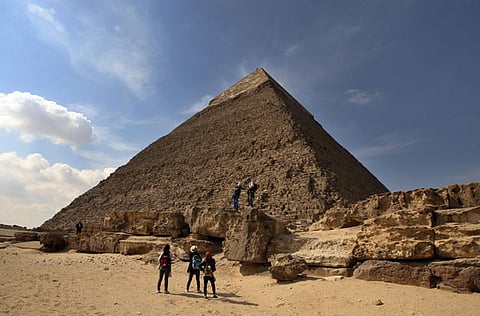Gulf travellers likely to be unfazed by new Egypt visa rule
Starting May 15, individual travellers that are not part of a package tour will not be able to buy visas-on-arrival

Dubai: An overhaul of Egypt’s visa system announced last week is unlikely to keep Gulf residents from jetting off to see the pyramids this summer.
Starting May 15, individual travellers that are not part of a package tour will no longer be able to buy visas-on-arrival and will need to apply for a visa at their nearest embassy or consulate.
Tourism experts have said that the government’s decision could hurt its already struggling tourism industry, which has been hit by four years of political instability sparked by the 2011 revolution. Visitor numbers have dropped from more than 14.7 million in 2010 to 9.9 million in 2014. The industry is gradually recovering, however, with visitor numbers last year up from 9.5 million in 2013.
Demand from the Gulf is unlikely to be affected as a result of the scrapping of the visas-on-arrival policy, experts said.
“Although there is greater time and inconvenience in the new process, I don’t believe this will reduce demand from Gulf nationals and residents during the summer period,” said Christopher Hewett, senior consultant at TRI Consulting in Dubai, by email.
Chiheb Bin Mahmoud, executive vice president and head of hotels and hospitality for the Middle East and Africa at real estate consultancy, JLL echoed his views: “I don’t think it will have a big impact [on Gulf visitor numbers] because the Gulf market has not recovered its position in Egypt yet. The demand from travellers has been low for many years.”
Hewett, meanwhile, said the decision will not impact Egypt’s tourism numbers and revenue, since individual travellers account for a smaller percentage of total visitor numbers in the country.
“The visa rule changes only apply for individual travellers and not tour groups, which make up 75-80 per cent of the total visitor numbers to Egypt. Therefore, as this change only applies to the minority of visitors, I do not foresee an impact on the revenue or visitor projections this year,” he said.
Last minute
Egypt’s former tourism minister, Hesham Zaazou told the Guardian that before the 2011 revolution, 25 per cent of all tourists that arrived to the country were not part of a package tour. Following the revolution, he told the Guardian, individual tourists accounted for between 15 and 20 per cent of all visitors in the country, which he said were about two million people.
Zaazou also reportedly said that the change in the visa rule may affect inbound tourism from the Gulf because travellers from there often leave at the last minute.
Egypt has traditionally been a popular tourism destination for Gulf residents, who have frequented places like Sharm Al Shaikh and Cairo.
According to some reports, the reason behind the travel restriction is security services requiring additional time to assess each application to enter Egypt, which has been mired in civil unrest.
Bin Mahmoud said that Egypt’s new visa rule and tighter control of its security issue boosts tourists’ confidence in the country.
Experts have questioned the timing of the government’s move, which came only days after hosting an economic conference aimed at attracting investment into the country and drafting a plan to bring in $20 billion (Dh73.4 billion) in tourism revenue by 2020 by welcoming 20 million visitors.
“It is a very surprising move from the Egyptian Foreign Ministry and from the outside doesn’t appear to have been coordinated with the Tourism Ministry. It is all the more surprising given the recent steps forward on inward investment and the momentum and large recovery which Egyptian tourism is making since the middle of 2014, the importance of tourism to the country’s GDP [Gross Domestic Product] and the 2020 goals the country had set for itself,” said Jeff Strachan, general manager of Insights Management Consultancy, which focuses on tourism.
On a different note, tour operators are optimistic that they will sell more tour packages to travellers to Egypt this year.
“There will be an increase in business. At same time, there will be many more serious people travelling with more structured holidays,” said Kulwant Singh, managing director of Lama Tours.
Sign up for the Daily Briefing
Get the latest news and updates straight to your inbox



